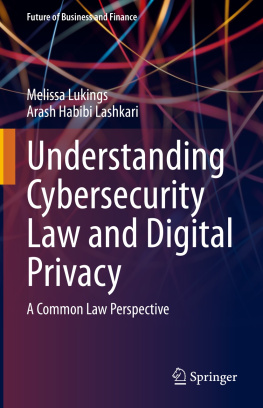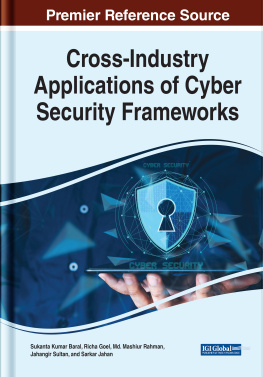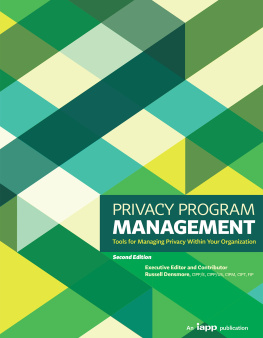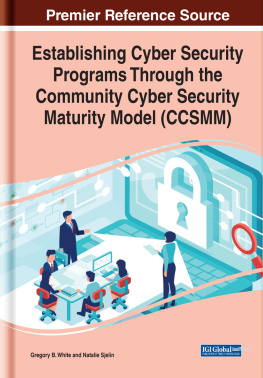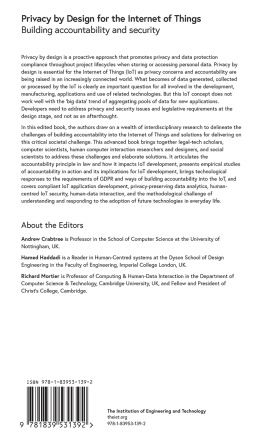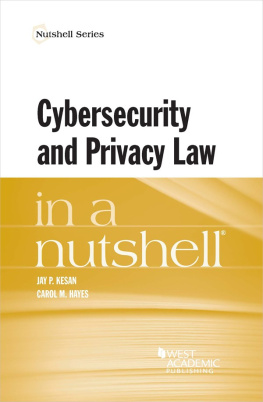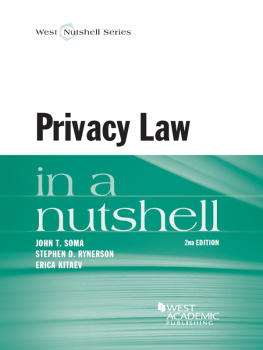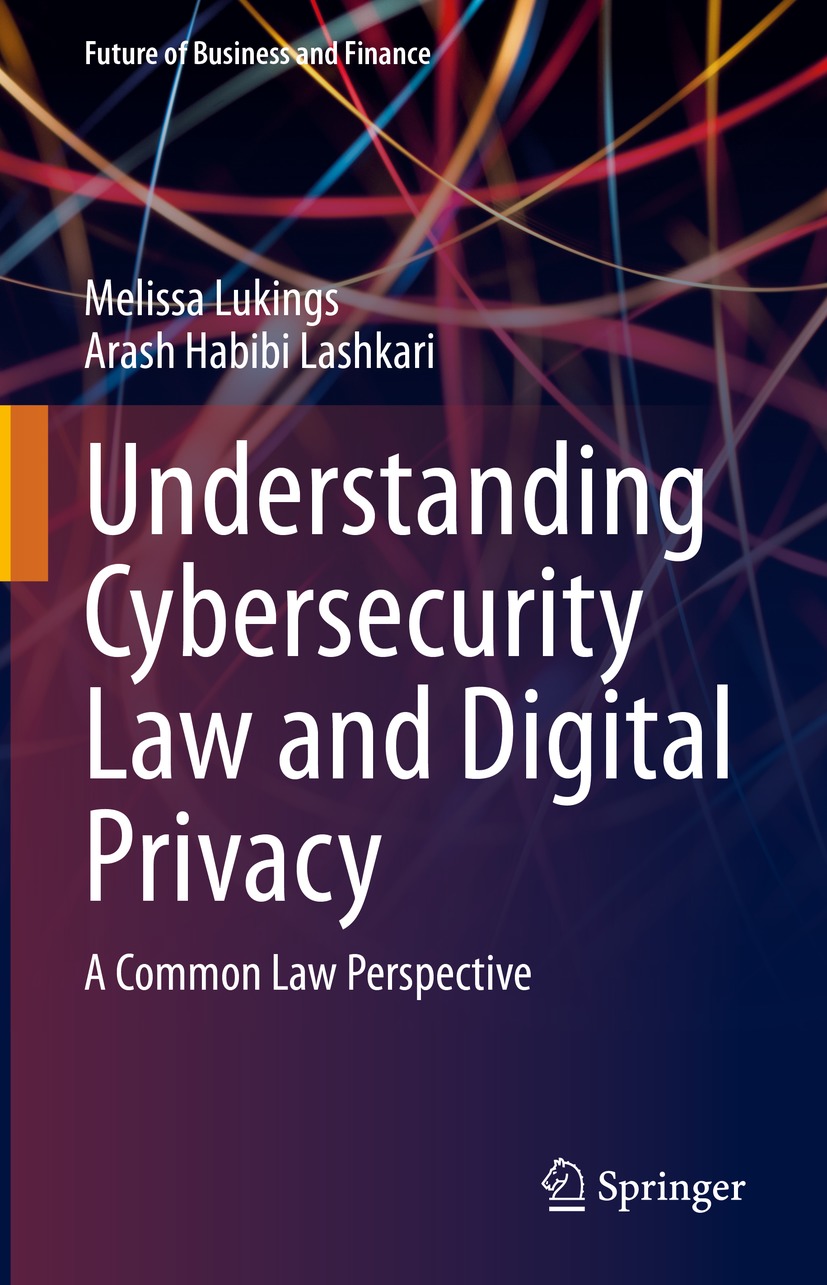Future of Business and Finance
The Future of Business and Finance book series features professional works aimed at defining, describing and charting the future trends in these fields. The focus is mainly on strategic directions, technological advances, challenges and solutions which may affect the way we do business tomorrow, including the future of sustainability and governance practices. Mainly written by practitioners, consultants and academic thinkers, the books are intended to spark and inform further discussions and developments.
More information about this series at http://www.springer.com/series/16360
Melissa Lukings and Arash Habibi Lashkari
Understanding Cybersecurity Law and Digital Privacy
A Common Law Perspective

Logo of the publisher
Melissa Lukings
Faculty of Law, University of New Brunswick, Fredericton, NB, Canada
Arash Habibi Lashkari
Canadian Institute for Cybersecurity, University of New Brunswick, Fredericton, NB, Canada
ISSN 2662-2467 e-ISSN 2662-2475
Future of Business and Finance
ISBN 978-3-030-88703-2 e-ISBN 978-3-030-88704-9
https://doi.org/10.1007/978-3-030-88704-9
The Editor(s) (if applicable) and The Author(s), under exclusive license to Springer Nature Switzerland AG 2022
This work is subject to copyright. All rights are solely and exclusively licensed by the Publisher, whether the whole or part of the material is concerned, specifically the rights of translation, reprinting, reuse of illustrations, recitation, broadcasting, reproduction on microfilms or in any other physical way, and transmission or information storage and retrieval, electronic adaptation, computer software, or by similar or dissimilar methodology now known or hereafter developed.
The use of general descriptive names, registered names, trademarks, service marks, etc. in this publication does not imply, even in the absence of a specific statement, that such names are exempt from the relevant protective laws and regulations and therefore free for general use.
The publisher, the authors and the editors are safe to assume that the advice and information in this book are believed to be true and accurate at the date of publication. Neither the publisher nor the authors or the editors give a warranty, expressed or implied, with respect to the material contained herein or for any errors or omissions that may have been made. The publisher remains neutral with regard to jurisdictional claims in published maps and institutional affiliations.
This Springer imprint is published by the registered company Springer Nature Switzerland AG
The registered company address is: Gewerbestrasse 11, 6330 Cham, Switzerland
Melissa Lukings
For my family and friends, whether biological or chosen; near or far:
AA, AHL, AMR, BCW, BEJ, CJD, CRT, DLL, JHMD, HAGL, HES, HJ, KNH, MAL, MKLL, MKNL, NCO, PAL, RLG, SSD, and everyone who fits under the extended family and friends designation.
You know who you are.
And for my feline companions; my furbaby beneficiaries; my treasured cat children: Miss Kitty S. Bird; Sir Thomas K. Brodie; Lady LaLuna de Fats Purrtato; Mister George J. Flanders; and the late Oliver Olliebug von Trashnugget.
Arash Habibi Lashkari
For
My wife Farnaz and children, Kourosh and Kianna,
And my father Bahman, mother Zeynab, and sister Ziba,
And my teachers and lecturers, for all the lessons youve taught me.
Preface
The internet, digital media, and online communication have become an integral part of our modern world. Over the past few decades, we have seen the internet evolve, becoming anchored within our households, and a near requirement for accessing education. Our previous hardwired telephone systems were replaced first by mobile phones and then by smartphones. Our cars, our watches, our appliances, all are connected and help to keep us connected to each other. Economically, our commercial endeavors have shifted to increase their reach to a wider range of potential customers, no longer limited by distance creating the online economy.
While we are more connected than ever before, our connectedness has become necessarily dependent on our having sustainable and reliable access to digital technology and online networks. As our society has shifted away from the paper filing methods of the past and onto digital platforms, we have begun storing greater amounts of data, records, media, creative content, and other valuable information online. More still, to improve access to banking and financial services, many of these corporations have launched digital platforms, apps, and other networked methods to the delight of many consumers. Even more recently, we have seen health care service provision move from an in-person clinical model to a model based on online remote consultation, even from the comfort of our own homes. The access and freedom we have with our ability to share information is unprecedented in our history.
This interconnectedness, however, comes with its own novel set of risks and necessary risk assessments. Rather than protecting our stored records in locked filing cabinets, in offices and storage roomscarbon copied, printed, or written on paperwe are increasingly moving toward full digital integration with online cloud-based platforms for data storage. While we no longer have to safeguard our documents and data with security guards, locking systems, alarms, and other physical protective mechanisms, we have also removed the barrier of distance from accessing our stored records. Rather than safeguarding our data from localized tangible physical intrusion, we must now work to create and maintain safeguards and protective standards that will prevent remote intangible digital intrusion; cybersecuritya whole new world.
In the not-so-recent past, we relied on physical safeguards to prevent data theft and unauthorized access. When those safeguards failed, we would turn to the legal systemcriminal or civil depending on the severity of the theft or breachto penalize or provide a remedy in law for the act. It should not come as a surprise that our shift onto online platforms has created an obstacle in our ability to apply the law as it was previously written and applied. In this way, our law has had to evolve from our former concept of privacy law and security in law to our newer fields of data privacy law and cybersecurity in law for our online medium.
Understanding Cybersecurity and Digital PrivacyA Common Law Perspective is the second book in the Understanding Cybersecurity Series (UCS), following the precursory publication, Understanding Cybersecurity Management in FinTech mid-way through 2021. In this installment of the series, we discuss the theory and principles of legal application in (data) privacy and (cyber) security which underpin our digital relationships; personal, professional, commercial, and organizational.
This book provides insight into the pre-digital concept of property ownership, possession, interest, and privacy which form the basis of our tort and property laws. We examine the roots of systems of law and legal governance, building up to an analysis of cybercriminal activities and the issues which arise in dealing with these new areas under the old law. We discuss the methods used by a selection of common law countries in addressing privacy and online interpersonal matters, providing a comparison between these models. Finally, we take a look at the upcoming trends in data privacy and cybersecurity law.

